Opera for the People
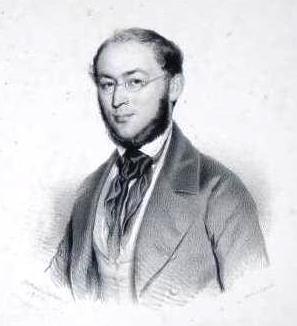
Portrait of Franz von Suppé by Gabriel Decker, 1847
I’ve got a bit of a tongue twister for you today. Try to say the name of the composer Francesco Ezechiele Ermenegildo, Cavaliere Suppé-Demelli rapidly five times. Fortunately, the composer under consideration shortened his professional name to Franz von Suppé (1819-1895) and he became a leading composer and conductor in Vienna. In fact, his operettas enjoyed a success that rivaled that of Frenchman Jacques Offenbach, and his musical comedies still survive and are staged today. Even if the name is not familiar, you will probably have heard his music.
His Early Years
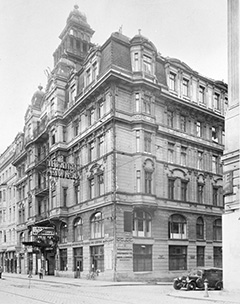
Theater an der Wien
The descriptive nature of his music has earned them frequent use in numerous animated cartoons, from Bugs Bunny, Betty Boop to Popeye the Sailor and beyond. Born on 18 April 1819, Suppé hailed from the town of Spalato, Dalmatia, nowadays called Split, Croatia. His father was a civil servant in the service of the Austrian Empire, and his mother was Viennese by birth. His musical talents were quickly discovered and equally quickly discouraged by his parents. Although he had written an entire mass setting called “Missa Dalmatica” by age 13, which was performed at a Franciscan church in Zara (Zadar) in 1835, Suppé was sent to Italy to study law.
Franz von Suppé: Leichte Kavallerie (Light Cavalry): Overture (Slovak State Philharmonic Orchestra, Košice; Alfred Walter, cond.)
First Success as a Composer
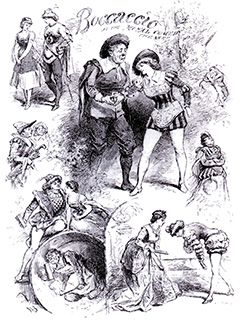
Poster for a Suppé “Boccaccio” production in London, 1882
Once in Italy, Suppé got in touch with a distant relative, namely the Italian opera great Gaetano Donizetti. Apparently, Donizetti supported the talents of the budding composer, and once his father had passed away, Suppé and his mother returned to Vienna. Initially, he considered studying medicine but soon turned his attention to music. He took counterpoint and lessons in composition with the great Viennese theorists Ignaz von Seyfried and Simon Sechter, and it was Seyfried who helped him secure his first post. Franz Pokorny, the director of several theaters in Vienna, Pressburg, Ödenburg and Baden bei Wien was looking for a conductor free of charge, but with the opportunity to present his own works to the public. Suppé jumped at the opportunity and his first complete singspiel score “Jung Lustig” (Young and Merry) was given on 5 March 1841. It received a favorable review, and the critic for the Theaterzeitung writes, “Melodious, rich in tender ideas and fine nuances, clearly and effectively orchestrated and containing such surprising modulations and transitions, that the overture and most of the songs and choruses had to be encored … The whole composition has traces of the Italian style but now and then goes in for thoroughly vernacular, simply handled themes.” Suppé later suggested that having had limited knowledge of German, he simply treated a “Jodler in the style of a sentimental Donizettian farewell.”
First Attempt at the Viennese Operetta
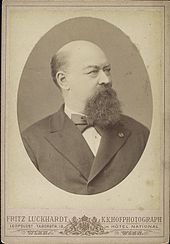
Portrait of Franz von Suppé
Within the next four years, Suppé composed well over 20 scores and by 1845 he was appointed Kapellmeister at the Theater an der Wien. He would stay in that position for the next 17 years, and enjoying great popularity, produced a string of lively and attractive music. The most characteristic phase of Suppé’s career began with “Das Pensionat” (The Boarding School) of 1860. It was his first successful attempt at a genuine Viennese operetta in answer to the phenomenally successful French operettas of Jacques Offenbach.
Suppé’s light and fluent style includes the ability to vary a phrase length or melodic and rhythmic figure in a personal and immediately effective way. A good many of his roughly 30 operettas and 180 farces, ballets and other stage works were performed more than 100 times. Two of his more ambitious operettas, “Boccaccio” and “Donna Juanita” have been performed at the Metropolitan Opera in New York, but they failed to become repertoire works in the United States. His increasing fame is reflected in invitations to visit the first Bayreuth festival in 1876, and Paris, Brussels, Germany and Italy.
Franz von Suppé: Die schöne Galathee (The Beautiful Galatea) (Andrea Bogner, soprano; Juliane Heyn, soprano; Hans-Jurg Rickenbacher, tenor; Michael Kupfer, baritone; Chor des Theaters der Stadt Koblenz; Rhenish State Philharmonic Orchestra; Thomas Eitler, cond.)
Increasing Interest in Sacred Music
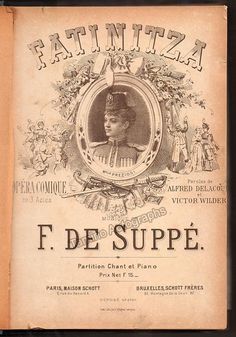
Suppé’s Fatinitza vocal score
As the virtual godfather of Viennese operetta, Suppé was given the freedom of the City in Vienna in 1881. He bought himself a country estate near the city, and composed until the end of his life. “Die Afrikareise” (The African Journey) became a success in Germany in 1883, and he was working on another operetta at the time of his death. However, Suppé had increasingly become interested in composing sacred music. He wrote a “Requiem” for his long-time friend Franz Pokorny, which was first performed during Pokorny’s memorial service on 22 November 1855. And we also find an oratorio, three masses, songs, symphonies and concert overtures in his oeuvre.
Suppé’s music is sparse in diction and free of sentimentality as it mediates between the French opéra-comique and the Italian opera buffa. His overtures are full of spirited energy and melodious charm, and their artistic instrumentation offers extended solos. His music does not sound particularly Viennese, but is decidedly international. In fact, in terms of subject matter and musical execution, his music displays the generous multi-national spirit of the old Austro-Hungarian Empire. The vividness of his themes and the irrepressible passion of his melodies found their way into movies, cartoons and video games and have thus found new life more then a century later.
Franz von Suppé: Requiem (Lisbon Gulbenkian Chorus; Lisbon Gulbenkian Orchestra; Michel Corboz, cond.)



